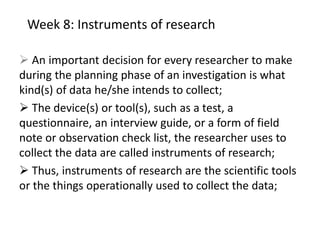Week 8-ELT Research-S2PING.pptx
•Download as PPTX, PDF•
0 likes•5 views
Dhcdhuijh hitrdgh
Report
Share
Report
Share

Recommended
Recommended
More Related Content
Similar to Week 8-ELT Research-S2PING.pptx
Similar to Week 8-ELT Research-S2PING.pptx (20)
Data Collection and Instrumentation (Lomibao, J-MAEd Math 1).pdf

Data Collection and Instrumentation (Lomibao, J-MAEd Math 1).pdf
Research Design, Process of research with examples

Research Design, Process of research with examples
1. What design did this study use (Experimental or Correlationa.docx

1. What design did this study use (Experimental or Correlationa.docx
Foundations of Agricultural Research by Prof Jayne Mugwe

Foundations of Agricultural Research by Prof Jayne Mugwe
Data Collection Procedures in Practical Research 2

Data Collection Procedures in Practical Research 2
Recently uploaded
Recently uploaded (20)
21st_Century_Skills_Framework_Final_Presentation_2.pptx

21st_Century_Skills_Framework_Final_Presentation_2.pptx
HMCS Vancouver Pre-Deployment Brief - May 2024 (Web Version).pptx

HMCS Vancouver Pre-Deployment Brief - May 2024 (Web Version).pptx
QUATER-1-PE-HEALTH-LC2- this is just a sample of unpacked lesson

QUATER-1-PE-HEALTH-LC2- this is just a sample of unpacked lesson
Observing-Correct-Grammar-in-Making-Definitions.pptx

Observing-Correct-Grammar-in-Making-Definitions.pptx
Introduction to TechSoup’s Digital Marketing Services and Use Cases

Introduction to TechSoup’s Digital Marketing Services and Use Cases
dusjagr & nano talk on open tools for agriculture research and learning

dusjagr & nano talk on open tools for agriculture research and learning
Simple, Complex, and Compound Sentences Exercises.pdf

Simple, Complex, and Compound Sentences Exercises.pdf
Week 8-ELT Research-S2PING.pptx
- 1. Week 8: Instruments of research An important decision for every researcher to make during the planning phase of an investigation is what kind(s) of data he/she intends to collect; The device(s) or tool(s), such as a test, a questionnaire, an interview guide, or a form of field note or observation check list, the researcher uses to collect the data are called instruments of research; Thus, instruments of research are the scientific tools or the things operationally used to collect the data;
- 2. • The whole process of preparing and developing instruments of research to collect the data is called instrumentation; • Instrumentation involves not only then selection or design of the instruments but also the procedures and the conditions under which the instruments will be administrated; • It is a mistake to think that that researchers need only locate or develop a “good” instrument, but he/she does not seriously give attention to time, frequency, administration of data collection; • A researcher’s decisions about time, frequency, and administration are always affected by the kind(s) of instrument to be used;
- 3. • The quality of instrumentation and the instrument itself determine the quality of data obtained in a research; • An instrument of research must be valid, reliable, objective, and practical; • A valid instrument is that it measures what is supposed to be measure; • A reliable instrument is one that gives consistent results; • An objective instrument is one that is absence of subjectivity; • A practical instrument is one that is easy to be used and understandable;
- 4. • Who provides the information (data) for a research? (i) Researchers themselves; it is also called researcher instruments; (ii) Directly from the subjects of the study; it is also called subject instruments; (iii) From others (informants or respondents); it also called informant/respondents instruments; (iv) Documents or manuscripts; they are in forms of written documents or manuscripts; (v) Social media and/or internets; they may be in the form of written data or audio-visual data;
- 5. • Some tips about developing a research instrument: (i) Be sure you are clear about what variables are to be assessed; (ii) Review existing instruments that measure similar variables in order to decide upon a format and to obtain ideas on specific items; (iii) Decide on a format for each variable; different variables often require different formats; (iv) Begin compiling and/or writing items; try to ensure that the vocabulary is appropriate for the intended informants or respondents; (v) …
- 6. (v) Have colleagues review the items for logical validity; supply colleagues with a copy of definitions and description of the intended respondents. Be sure to have them evaluate format as well the content; For beginners, please use expert validator; (vi) Revise items based on colleague feed back. At this point, try to have about twice as many items as researchers intend to use in the final form. Remember that more items generally provide higher reliability; (vii) Locate a group of people with experience appropriate to your study; Have them review the items for logical validity; make any revision needed, and complete the items; (viii) …
- 7. (viii) Try out the instrument with a group of respondents who are as similar as possible to the study respondents; (ix) If feasible, conduct a statistical item analysis (item discrimination and/or item difficulty) with the try-out data; (x) Select and revise items as necessary until the researcher has the number he/she wants; Notes: (i) a good and appropriate instrument may obtain and collect the valid and reliable data; (ii) Quality of data depends on the quality of instrument(s)